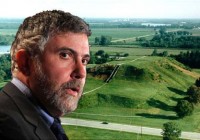If “no new nukes”—Wind won’t keep us warm
CHURCHVILLE, VA—The air over northeastern Japan is slightly radioactive—not at dangerous levels for people, but an indicator that higher levels might come. The newspapers in Japan and here are talking earnestly about failures in pressure vessels and falsified safety reporting, as they should.- Sunday, March 20, 2011

 CHURCHVLLE, VA—Paul Krugman is a big deal: Princeton professor, New York Times columnist and Nobel laureate (2008). Krugman wrote last week about the “food crisis, the second one to hit the world in the last three years.” His key statement: “what really stands out is the extent to which severe weather events have disrupted agricultural production. And these severe weather events are exactly the kind of thing we’d expect to see as rising concentrations of greenhouse gases change our climate—which means that the current food prices surge may be just beginning.”
CHURCHVLLE, VA—Paul Krugman is a big deal: Princeton professor, New York Times columnist and Nobel laureate (2008). Krugman wrote last week about the “food crisis, the second one to hit the world in the last three years.” His key statement: “what really stands out is the extent to which severe weather events have disrupted agricultural production. And these severe weather events are exactly the kind of thing we’d expect to see as rising concentrations of greenhouse gases change our climate—which means that the current food prices surge may be just beginning.”